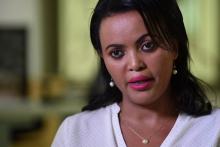SSP keynote to focus on scholarly publishing in Africa

Mariamawit Yeshak
Organisers of the SSPs 41st annual meeting have announced keynote speakers for the event.
The event, which will be held this year in San Diego, California, will run from May 29 to 31. As well as a plethora of presentations, meetings and seminars – as well as a busy exhibition – attendees will enjoy ample opportunities for meeting colleagues and sharing ideas at evening receptions, interactive lunches and other events.
On 29 May Mariamawit Yeshak will speak on Scholarly Publishing in Africa: Impact Factor vs Societal Impact.
Yeshak completed her tertiary schooling in Pharmacy at Addis Ababa University with a B. Pharm in 2001 and M.Sc. in 2005. She got a SIDA/Sarek grant to pursue her PhD at Uppsala University. She was invited to make research grant application to the International Science Program (ISP), Uppsala University, prior to completing her PhD. Yeshak leads a research group called BaSIL (Bioactive Secondary Metabolites for Improving Life), which studies biochemical properties of medicinal plants, and is still funded by the ISP. With Ethiopian Government grant, she studies indigenous knowledge systems specifically the clinical applications of traditional medicine.
Yeshak is a founding Fellow and Chair of the Ethiopian Young Academy of Sciences; and an inaugural fellow of Africa Science Leadership Program (ASLP). She is an inaugural ambassador of Next Einstein Forum (NEF) and a Young Affiliate of ‘The World Academy of Sciences (TWAS). Mariamawit publishes her work in peer reviewed journals.
In her keynote, Yeshak will address the disconnect between the rate of publication and impact on societal development in Africa, focusing on potential solutions for maximizing societal benefit from publishing and how publishers can help.
She said: 'Scholarly publishing is a fundamental aspect of scientific research communication and the knowledge sharing process. It is also a determinant for career advancement in most academic fields. In Africa, scholarly publishing does not have a long history; it dates back only to the second half of the twentieth century. While publishing faces various challenges, there are numerous opportunities, such as the inflow of research funds, digitalisation, and open access publishing, to make publishing easier for African scholars. As a result, many Africans are publishing their work in high-impact and top-rated journals. However, if one compares the rising rate of publication with societal development in Africa, the picture is very different. Africa still lags in social, economic and technological advancement.'
On Thursday 30 May Betsy Beaumon will present Why Inclusion Matters to Technology and Technology Matters to Inclusion.
Beaumon is the CEO of Benetech. She has served in executive leadership roles for both for-profit and nonprofit technology organisations, most recently as Benetech’s president, driving the development and growth of all Benetech initiatives including inclusive education, poverty alleviation, and human rights.
Under Beaumon's leadership Benetech has scaled its largest social enterprise, Bookshare, to more than 600,000 users in 80 countries, and launched Benetech Labs, to create the next impactful software and data innovations. She defined the concept of 'Born Accessible', a vision where all digital content is made accessible to everyone when created. This bold vision creates true and lasting systems change, through collaboration with major digital publishing players, and represents a rare case of a nonprofit disrupting its own service.
Beaumon is a social entrepreneur and engineer and has co-founded two software companies, including the first web-based Information and Referral service for human services. She holds a patent for her work in pioneering online global trade management applications. She has developed products across the software, semiconductor, and information sectors and previously held senior positions with BEA Systems, TradeBeam, Social Online Service, and Cisco Systems. She holds a degree in electrical engineering from Northwestern University.






